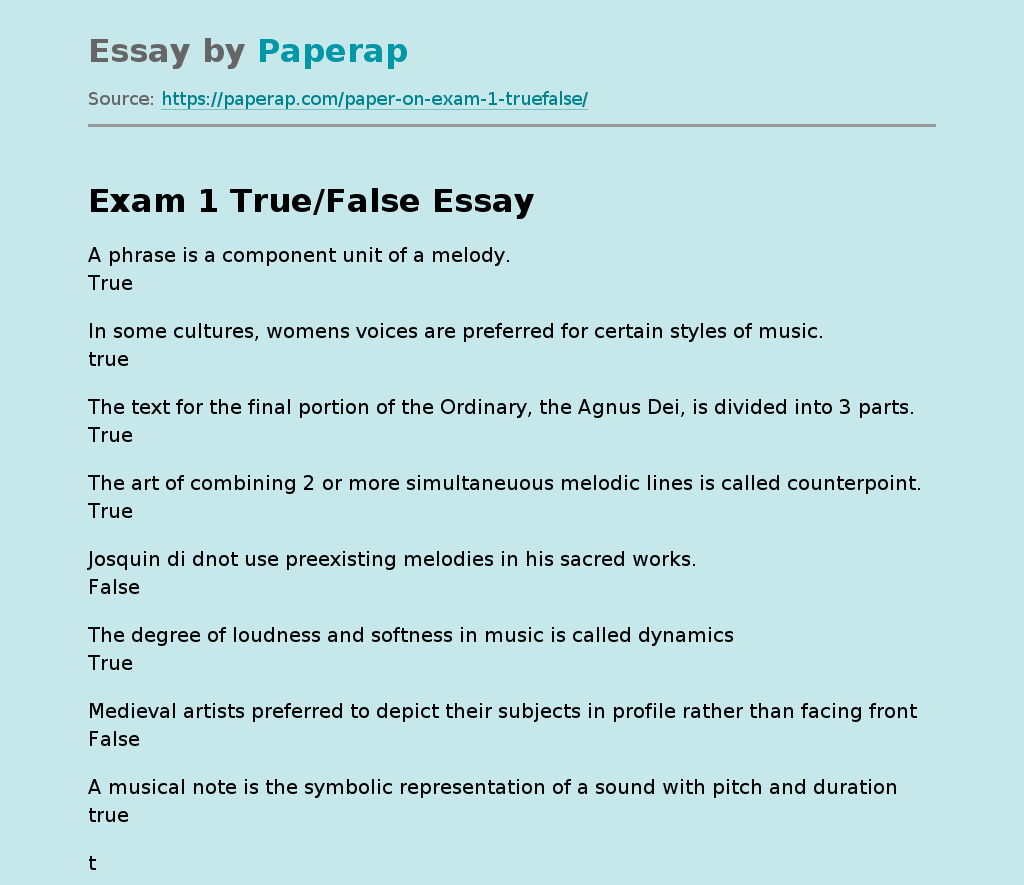Exam 1 True/False
Essay,
Pages 3 (600 words)
Views
73
A phrase is a component unit of a melody.
True
In some cultures, womens voices are preferred for certain styles of music.
true
The text for the final portion of the Ordinary, the Agnus Dei, is divided into 3 parts.
True
The art of combining 2 or more simultaneuous melodic lines is called counterpoint.
True
Josquin di dnot use preexisting melodies in his sacred works.
False
The degree of loudness and softness in music is called dynamics
True
Medieval artists preferred to depict their subjects in profile rather than facing front
False
A musical note is the symbolic representation of a sound with pitch and duration
true
the most recently invented member of the woodwind family is the saxophone
true
The term pizzicato means to play in a throbbing manner.
False
The tempo of a piece affects its mood and character
True
Polyrhythms are characteristic of musics of many African cultures
true
The phrases in the song Amazing Grace are of unequal length
False
The vernacular is the common language of a people
True
POlyphony was uniformly welcomed in all religious communities
false
only professional musicians performed secular music during the renaissance
false
a major scale can begin on any of the 12 semitones of the octave
true
melodies that skip in disjointed intervals are disjunct
true
a movement is a complete, comparatively independent division of a large scale work
true
the dominant is an example of an active chord,which can cause tension in music until it is resolved
true
string instruments are generally played by either bowing or plucking
true
each musical line in Gaude Maria virgo has the same rhythmic activity
False
A variety of world musics make use of pentatonic scales
true
Machaut’s chanson Ma fin est mon commencement reflects his era’s fascination with complexity
True
The Adhan is the islamic call to prayer
true
The element that organizes movement in time is called harmony
False
Syncopation is a rhythmic characteristic of American jazz
True
Specialized choirs that perform with organ are called a cappella ensembles
false
The monastic life was reserved for men only
False
Improvisation is common in Western music, but not in non-Western music
False
Allegro is an Italian term for a fast, cheerful tempo
True
the modes were developed from the major minor scales
false
the dance music of susato appeared in print and hence was not suitable for improvisation
false
the 2 scale types commonly found in Western music from about 1650 to 1900 are major and minor
true
traditional music of the middle and far east is typically polyphonicf
false
all world musics feature a strong pulse or beat
false
the melody and harmony move with the same rhythm in a homophonic texture
true
the 16th century saw a blossoming of instrumental dance music
true
the overall shape of a melody is called its range
false
a tritonic scale is made up of eight notes
false
in western music, the octave is divided into 7 equal parts, which makes up the chromatic scale
false
Hildegardes Allelluia O virga mediatrix has a neumatic text setting with some melismas
true
meter is an organizing principle shared by music and poetry
true
throughout history, womens voices have played a central role in the performance of church music
false
3 alternate notes of a scale, sounded simultaneously, form a triad
true
active chords seek to resolve to resting chords, imparting a sense of direction or goal
true
all pentatonic scales use the same notes and thus sound the same
false
the rebec was a type of wind instrument
false
the dates given for the beginning and end eras are precise ones
false
Exam 1 True/False. (2017, Dec 27). Retrieved from https://paperap.com/paper-on-exam-1-truefalse/
